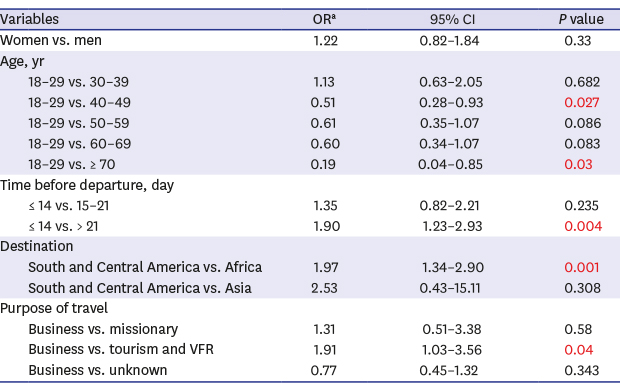2. Bazemore AW, Huntington M. The pretravel consultation. Am Fam Physician. 2009; 80(6):583–590.
3. Steffen R, Amitirigala I, Mutsch M. Health risks among travelers--need for regular updates. J Travel Med. 2008; 15(3):145–146.

4. LaRocque RC, Rao SR, Lee J, Ansdell V, Yates JA, Schwartz BS, et al. Global TravEpiNet: a national consortium of clinics providing care to international travelers--analysis of demographic characteristics, travel destinations, and pretravel healthcare of high-risk US international travelers, 2009–2011. Clin Infect Dis. 2012; 54(4):455–462.
5. Boubaker R, Meige P, Mialet C, Buffat CN, Uwanyiligira M, Widmer F, et al. Travellers' profile, travel patterns and vaccine practices--a 10-year prospective study in a Swiss Travel Clinic. J Travel Med. 2016; 23(1):pii: tav017.

8. Chin BS, Kim JY, Gianella S, Lee M. Travel pattern and prescription analysis at a single travel clinic specialized for yellow fever vaccination in South Korea. Infect Chemother. 2016; 48(1):20–30.

10. Korean Centers for Disease Control and Prevention. Traveler's health. Updated 2018. Accessed May 11, 2019.
http://www.cdc.go.kr.
13. Barnett ED, MacPherson DW, Stauffer WM, Loutan L, Hatz CF, Matteelli A, et al. The visiting friends or relatives traveler in the 21st century: time for a new definition. J Travel Med. 2010; 17(3):163–170.

14. Hill DR. Mapping the risk of yellow fever infection. Curr Infect Dis Rep. 2012; 14(3):246–255.

15. World Health Organization. Yellow fever in the WHO African and American regions, 2010. Wkly Epidemiol Rec. 2011; 86(34):370–376.
16. Barnett ED, Wilder-Smith A, Wilson ME. Yellow fever vaccines and international travelers. Expert Rev Vaccines. 2008; 7(5):579–587.

17. Toovey S. Travelling to Africa: health risks reviewed. Travel Med Infect Dis. 2006; 4(3-4):147–158.

18. Muehlberger N, Jelinek T, Schlipkoeter U, von Sonnenburg F, Nothdurft HD. Effectiveness of chemoprophylaxis and other determinants of malaria in travellers to Kenya. Trop Med Int Health. 1998; 3(5):357–363.

19. Chen LH, Leder K, Barbre KA, Schlagenhauf P, Libman M, Keystone J, et al. Business travel-associated illness: a GeoSentinel analysis. J Travel Med. 2018; 25(1):

20. Farquharson L, Noble LM, Barker C, Behrens RH. Health beliefs and communication in the travel clinic consultation as predictors of adherence to malaria chemoprophylaxis. Br J Health Psychol. 2004; 9(Pt 2):201–217.

21. Dahlgren AL, DeRoo L, Steffen R. Prevention of travel-related infectious diseases: knowledge, practices and attitudes of Swedish travellers. Scand J Infect Dis. 2006; 38(11-12):1074–1080.

22. Woś M, Korzeniewski K. The older traveller. Int Marit Health. 2018; 69(4):285–296.

23. Jaeger VK, Tschudi N, Rüegg R, Hatz C, Bühler S. The elderly, the young and the pregnant traveler: a retrospective data analysis from a large Swiss Travel Center with a special focus on malaria prophylaxis and yellow fever vaccination. Travel Med Infect Dis. 2015; 13(6):475–484.
24. Khan NM, Jentes ES, Brown C, Han P, Rao SR, Kozarsky P, et al. Pre-travel medical preparation of business and occupational travelers: an analysis of the global TravEpiNet consortium, 2009 to 2012. J Occup Environ Med. 2016; 58(1):76–82.
25. Pavli A, Silvestros C, Patrinos S, Lymperi I, Maltezou HC. Pre-travel preparation practices among business travellers to tropical and subtropical destinations: results from the Athens International Airport Survey. Travel Med Infect Dis. 2014; 12(4):364–369.








 PDF
PDF Citation
Citation Print
Print




 XML Download
XML Download